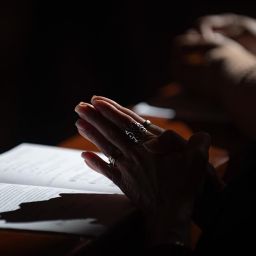By Father Jacob Dankasa
Special to The Texas Catholic
We hear and say phrases like people of faith, Christian faith, live by faith, etc., and there are several ways of talking about and describing faith. Faith can either be the religion or the way the religion is lived, or even just a belief in something. For us as Christians, our description of faith will be about our religion and the way we accept or live it. Faith for us is to profess belief in the one God and in Jesus Christ, His only Son. This is the Christian faith, and we are expected to live by the tenets of this belief. To truly live out our faith well, we must be ready to be uncomfortable. Of course, this sounds ambiguous, but let us look at it.
The Christian faith by its nature puts some demands on those of us who profess it. To live that faith adequately, we must be ready to accept or reject certain things that may appear to be normal to those who do not share our core values and beliefs. This is where faith becomes uncomfortable and, in fact, it has to be uncomfortable for it to be a genuine faith when it confronts an opposing view. We must be ready to accept the “uncomfortableness” of faith in order to live it.
For example, when I’m in a situation where someone tells me that God does not exist, it should make me feel uncomfortable! The core of my faith is being challenged because someone does not understand what I understand. It’s that discomfort that will enable me to reject their views, and to find a way of explaining or showing why I believe in the existence of God. Another belief that is often challenged is our Catholic belief that Mary is the mother of God. If someone tells me she is not, it should make me uncomfortable. (Note that “uncomfortable” does not mean “angry.”) It means that I have been given an opportunity to explain my faith in the best way that I can; it means that I have a teachable moment; it means that I need to explain exactly what I believe. An uncomfortable faith is a faith that leads to effective evangelization and catechesis. When my faith is challenged, it should make me uncomfortable in the sense that I see an opportunity to teach and enlighten, rather than to be angry and fire back with negativity.
An uncomfortable faith is a faith that encounters rejection but is strengthened because the person of faith sees an opportunity to teach. Your teachings may be accepted or not, you may succeed in changing minds or not, but you can leave the scene feeling good because you did what you needed to do — you tried to help someone understand what you truly believe. When it comes to issues of faith, belief, or religion, we must avoid the temptation to respond to negativity with negativity, thus missing the opportunity to teach about our faith. Our goal should always be to help someone grow in the same understanding that enriches our own faith.
On the other hand, if my faith is challenged and I don’t feel uncomfortable about it, it may be an indication of a lukewarm attitude toward my faith. Faith issues are sensitive and challenging. And when we come across expressions that go against our core beliefs, we should be able to reject them. Similarly, when we come across teachings that enhance or reinforce our beliefs, we should be able to accept them. Neutrality does not enhance faith. Our faith needs to grow, not become stagnant or lukewarm.
True and sincere faith is neither divisive nor toxic. It only grows better when it is challenged because it presents us with a teachable moment — an opportunity to evangelize. Faith is enhanced when its tenets are reinforced, because it leads to growth. Just don’t let faith issues depress you — the God we serve desires our happiness as we journey with Him in faith. Expect uncomfortable moments of faith and learn how to handle them.
Father Jacob Dankasa is the pastor of Holy Family of Nazareth Catholic Church in Irving.















